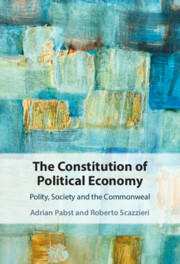Book contents
- The Constitution of Political Economy
- The Constitution of Political Economy
- Copyright page
- Contents
- Tables
- Preface
- Acknowledgements
- Introduction
- Part I Interdependence and the Economic Constitution
- 1 Political Economy in Question
- 2 Sociability and Interdependence
- 3 Association and the Division of Labour
- 4 The Constitution of the Economy
- Part II Political Spaces and Policy Actions
- References
- Name Index
- Subject Index
3 - Association and the Division of Labour
from Part I - Interdependence and the Economic Constitution
Published online by Cambridge University Press: 03 August 2023
- The Constitution of Political Economy
- The Constitution of Political Economy
- Copyright page
- Contents
- Tables
- Preface
- Acknowledgements
- Introduction
- Part I Interdependence and the Economic Constitution
- 1 Political Economy in Question
- 2 Sociability and Interdependence
- 3 Association and the Division of Labour
- 4 The Constitution of the Economy
- Part II Political Spaces and Policy Actions
- References
- Name Index
- Subject Index
Summary
Mutually fitting objectives presuppose capabilities and dispositions whose relative positions are identifiable and mutually recognized. This chapter reconstructs Adam Smith’s argument from his theory of fellow feeling to the theory of the division of labour and examines E.G. Wakefield’s reappraisal of Smith’s theory in terms of the distinction between simple cooperation and complex cooperation. Complex cooperation in the production sphere requires that the specific tasks carried out by specialized actors generate networks of materials transferred from one producer (or set of producers) to another. Division of labour by complex cooperation involves the dimensions of capabilities, tasks, and materials and requires proportionality conditions at the level of capabilities and tasks as discussed in Babbage’s law of multiples. A functioning network based on complex cooperation also requires a proportionality condition for interdependent materials in the light of the Hawkins-Simon condition for a self-reproducing economy. Alternative arrangements of capabilities, tasks, and materials bring about different production regimes, which are associated with different modes of coordination between production processes. The chapter examines the conditions under which the change of production regime entails switching to a different structure of social networks and leads to a different material constitution of the polity.
- Type
- Chapter
- Information
- The Constitution of Political EconomyPolity, Society and the Commonweal, pp. 62 - 95Publisher: Cambridge University PressPrint publication year: 2023



